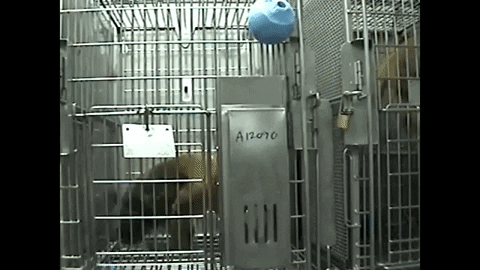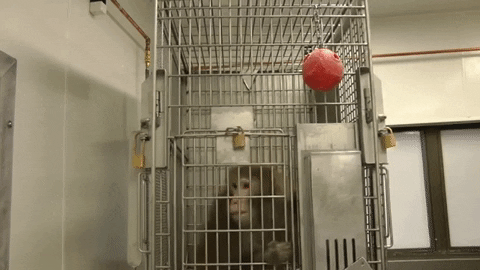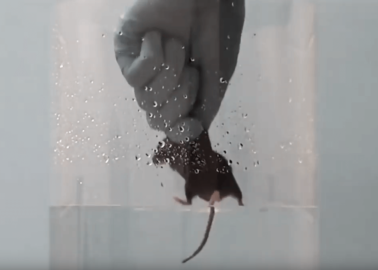VIDEO: This US Lab Torments Imprisoned Monkeys, Drives Them Mad
How would you feel if you spent your whole life in isolation? Just a few months of lockdown have been challenging for most of us – sometimes, it might even have felt like the walls are closing in. As you get excited at the chance to see your loved ones again, can you even imagine how monkeys who spent decades in solitary confinement must have felt?
Decades in Isolation
Experimenters at the University of Massachusetts–Amherst (UMass) and a number of primate laboratories in the US spent decades studying monkeys to see how imprisonment in laboratories drives them insane. They said that they were tormenting monkeys to “help” them, but even though they published dozens of papers describing their findings, not a single improvement has been mandated to help these long-suffering animals. The US government has never even acted on the results of these horrific studies.
Here’s what UMass and the other experimenters have shown again and again: imprisonment in laboratories is so stressful that monkeys are driven mad, their immune systems are compromised, and data from any experiments done on them is virtually useless.
Stripped of everything that makes life worth living, gentle monkeys are not “housed” or even “caged” in laboratories so much as they are “stowed” like luggage or “stored” as if they were merely beakers or test tubes.
Solitary confinement is the bleakest and most inhumane of circumstances. The United Nations calls it a form of torture, on the same level as waterboarding.

Stressed monkeys imprisoned at UMass are stowed away like luggage, stacked against a breeze-block wall.
Kept in austere cages barely larger than themselves, sensitive and naturally social monkeys suffer from profound loneliness and psychosis. They pace, pull out their own hair, and bite themselves in desperate attempts to fill the utter impoverishment of their lives with any kind of stimulation.
 Science has known for 70 years that isolation creates psychosis.
Science has known for 70 years that isolation creates psychosis.
Way back in 1951, McGill University used graduate students in an experiment to test the prolonged effects of solitary confinement using a simulated prison cell. The experiment was designed to last six weeks. It was cancelled after just seven days because students began hallucinating and suffered from severe mental breakdowns.
Nonetheless, here we are, two decades into the 21st century, and monkeys in laboratories around the world are being kept inside barren cages and denied access to anything that might soothe their fraying nerves.
Mental breakdowns are inevitable.
The screams of other monkeys enduring experimentation ricochet off the breeze-block walls as unnaturally bright fluorescent light beats down on their cramped cages. Monkeys exhibit stereotypic behaviour patterns, such as repetitive and purposeless movements like pacing, circling, swinging, and rocking, to alleviate their mental anguish.
As their mental pain increases, monkeys will pull out their hair, engage in behaviour such as the “eye poke” – in which they press on one corner of an eye with their thumb – or exhibit anxious behaviour such as yawning or scratching.
Monkeys under the strain of confinement also will turn to aggressive types of behaviour, such as assuming a threatening posture or vigorously shaking their cages.

We have known for decades that monkeys need access to outdoor spaces and to far more enrichment than laboratories can possibly provide. However, the experimentation industry clearly doesn’t care.
These Experiments Have Ended
UMass tried to keep you from seeing this video: PETA US filed a records request for the footage in 2017 – which was denied by the university – and then filed a lawsuit in March 2019. Before PETA US even got the footage, the experimenter retired!
There’s No Humane Way to Experiment on Monkeys
The primate species most commonly used in laboratories around the world include rhesus macaques, crab-eating macaques, baboons, squirrel monkeys, and marmosets. In their natural habitats, these monkeys may travel for miles, foraging for a variety of foods, socialising with family and friends, and engaging in various other activities – such as climbing hills, swimming, and caring for their young.
In laboratories worldwide, they may be caged alone, prevented from engaging in the social interaction that they so desperately need in order to thrive, and deprived of any meaningful control over their lives.

Help Monkeys in Laboratories
These particular experiments may be over, but thousands of monkeys are still imprisoned in laboratories. At the Biomedical Primate Research Centre in the Netherlands – Europe’s largest primate laboratory and breeding centre – at any given time, approximately 1,500 monkeys are held for breeding, and many are experimented on. They may be shaved, tattooed, left susceptible to injuries as a result of drugging, placed in restraint cages, infected with debilitating diseases, or even killed in full view of their companions.
Please urge the Dutch government to end the use of monkeys in experiments:



